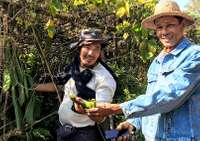Coup de projecteur sur deux membres d’ECHOcommunity : M. Tuntun et Thaung Si 2020-04-08

Extrait d’un rapport de Patrick Trail - ECHO Asie
En me promenant dans la ferme avec M. Tuntun dans la campagne du Myanmar, je ne peux m’empêcher de sourire lorsqu’il me montre fièrement le biochar qu’il fabrique et utilise dans son mélange pour ses semis d’arbres fruitiers. Plutôt que de les brûler et de disséminer le carbone dans l’atmosphère, il transforme désormais ses déchets organiques issus de la ferme en une ressource précieuse qui peut être utilisée pour augmenter les récoltes.
Il y a environ un an, M. Tuntun a participé à un atelier sur la conservation des semences à Pyin Oo Lwin. Lors d’une séance de travaux pratiques, il y a appris à fabriquer du biochar. En rentrant chez lui, il a immédiatement essayé par lui-même et a rencontré beaucoup de succès. M. Tuntun a même créé une page Facebook sur laquelle il partage ses techniques agricoles avec d’autres agriculteurs birmans, expliquant des pratiques comme le biochar et beaucoup d’autres !

Thaung Si (à gauche) et Tuntun (à droite) montrant des graines de haricot sabre provenant de la banque de semences d’ECHO Asie. Elles sont désormais cultivées pour approvisionner la banque de semences au Myanmar.
M. Thaung Si, notre partenaire clé dans la région, est en grande partie responsable de ce qui s’y est passé. En tant qu’ami et partenaire de longue date d’ECHO Asie, Thaung Si nous a rejoint à de nombreuses reprises lors de formations. Il nous a beaucoup appris. Il y a trois ans, il a créé une banque communautaire de semences au séminaire théologique baptiste de Lisu. Par l’intermédiaire de sa banque de semences, il enseigne l’agriculture et les pratiques de jardinage aux étudiants. Il a indirectement amélioré la vie de nombreuses personnes qui ont pu semer des graines de différents types. C’est justement ici que M. Tuntun et une centaine d’autres agriculteurs et participants locaux ont reçu l’an dernier la formation sur le biochar et sur d’autres techniques. Thaung Si continue depuis à suivre leurs progrès régulièrement.
La communauté d’ECHO compte de nombreux partenaires aussi dévoués que Thaunag Si dans toute la région et dans le monde entier. Ces partenaires, lorsqu’ils sont bien équipés, sont capables d’aider de nombreuses personnes !